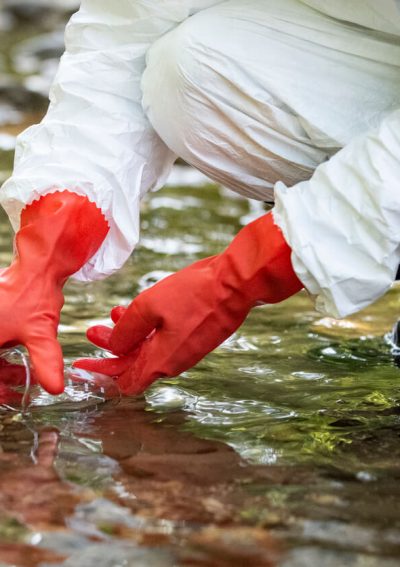Camp Lejeune Water Contamination
On-base leaks and spills, as well as an off-base business mishandling chemicals, led to water contamination at the Tarawa Terrace and Hadnot Point water treatment plants at Marine Corps Base Camp Lejeune. Trichlorethylene (TCE), perchloroethylene (PCE), benzene and vinyl chloride were all detected.

What Is Camp Lejeune?
Camp Lejeune, also known as Marine Corps Base Camp Lejeune, is a military base located on the coast in Jacksonville, North Carolina. In addition to Marine Corps command, it also houses a Navy command and a Coast Guard command.
Originally established in 1942, Camp Lejeune is a large base that includes housing, training and satellite camps as well as New River Air Station. Its satellite camps include Camp Geiger and Camp Johnson. The camp boasts a population of more than 34,000.
In 1982, the Marine Corps discovered that drinking water provided by two water treatment plants on the base were contaminated with dangerous chemicals called specific volatile organic compounds (VOCs) since the 1950s.
The Agency for Toxic Substances and Disease Registry (ATSDR) has linked Camp Lejeune water contamination to cancer, birth defects, neurological effects, neurobehavioral problems and other diseases.
How Did the Water Get Contaminated at Camp Lejeune?
A combination of on-base and off-base chemical spills and leaks caused the water contamination at two of Camp Lejeune’s water treatment plants, Tarawa Terrace and Hadnot Point.
An off-base dry cleaner called ABC One-Hour Cleaners, a designated Superfund site, that used improper waste disposal practices primarily caused contamination at Tarawa Terrace. These improper methods caused chemicals to leak into the groundwater and into wells that then sent the water to the treatment plant. On-base spills and leaks also contributed to the contamination.
On-base spills, underground storage leaks and drums at dumps and storage lots were the primary causes of water contamination at Hadnot Point.
Camp Lejeune Water Contaminants
The government has identified four major Camp Lejeune water contaminants. These are: Tricholorethylene (TCE), perchloroethylene (PCE), benzene and vinyl chloride. These contaminants are all known causes of serious negative health outcomes.
Trichloroethylene and Perchloroethylene
Trichloroethylene and perchloroethylene are volatile organic compounds. VOCs are a group of chemicals that evaporate easily and are used as solvents and fuels.
Both TCE and PCE are used to clean metal machine parts and in dry cleaning. Health effects of TCE and PCE exposure include cancer and birth defects.
Benzene
Benzene is a colorless liquid used to make other industrial chemicals. These chemicals are then used to make materials such as nylon, plastic and synthetic fibers.
It’s also used to make some drugs, detergents and pesticides. The chemical occurs naturally in cigarette smoke and gas. Studies have linked benzene exposure to health issues such as miscarriages and multiple myeloma.
Vinyl Chloride
Vinyl chloride is a gas at room temperature and a gas at low temperature or if kept under high pressure. It’s a man made chemical used to produce polyvinyl chloride (PVC). Manufacturers make pipes, packing materials and coatings from PVC.
Research has linked vinyl chloride exposure to liver cirrhosis, cancer and other health issues.
Health Conditions Associated with Contaminated Camp Lejeune Water
Studies have linked contaminated water at Camp Lejeune to several health conditions from cancer to neurological diseases, such as Parkinson’s disease.
To assess which health conditions were specifically tied to Camp Lejeune water contamination, ATSDR studied people who were at the base and looked at research from other groups of people exposed to TCE, PCE, benzene and vinyl chloride.
- Babies being small for gestational age
- Brain cancer
- Breast cancer
- Cardiac defects
- Cervical cancer
- End-stage renal disease
- Esophageal cancer
- Eye defects
- Fetal death
- Hodgkin lymphoma
- Impaired immune system function
- Kidney cancer
- Leukemia
- Liver cancer
- Liver cirrhosis
- Low birth weight
- Lung cancer
- Major malformations
- Miscarriage
- Mood effects (e.g., anxiety or depression)
- Multiple myeloma
- Nasal passages blocked with bone tissue
- Neural tube defects
- Neurobehavioral performance deficits such as delayed recall
- Neurological effects (e.g., memory loss, attention or color blindness)
- Non-Hodgkin lymphoma
- Oral cleft defects (e.g., cleft lip)
- Ovarian cancer
- Parkinson's disease
- Prostate cancer
- Rectal cancer
- Scleroderma
- Skin disorders
- Soft tissue cancer
Fortunately, not everyone exposed to the chemicals will develop a problem.
Whether or not someone develops a health issue depends on how long they were exposed, how much they were exposed to, how they were exposed (drinking or breathing) and their overall health.
It also matters when a person was exposed, such as during infancy or pregnancy. Children born to mothers exposed to contaminated water are at the most risk.
Is the Water at Camp Lejeune Safe to Drink?
The water at Camp Lejeune has been tested and has reportedly been safe to drink since at least March 1987 and is still considered safe today. State laws and regulations require that the base check the water every quarter for the presence of any VOCs.
Each year, the base discloses the results of water testing to the residents. The base closed contaminated wells in 1985.
New Federal Law Allows for Compensation
In August 2022, the President signed the Honoring Our PACT Act of 2022 bill into law. The bill includes the Camp Lejeune Justice Act of 2022.
Under the law people who developed health problems may be able to file a Camp Lejeune water contamination lawsuit for compensation for their illnesses. The law also allows people who were in-utero to file a claim.
People exposed for at least 30 days between Aug. 1, 1953 and Dec. 31, 1987 who developed health issues linked to contaminated water at the base may qualify for compensation, according to guidelines in the bill.
The VA already provides health care coverage for veterans under the Caring for Camp Lejeune Families Act of 2012. It also allows for disability compensation for veterans, reservists and National Guard members exposed to water at Camp Lejeune.
14 Cited Research Articles
Consumernotice.org adheres to the highest ethical standards for content production and references only credible sources of information, including government reports, interviews with experts, highly regarded nonprofit organizations, peer-reviewed journals, court records and academic organizations. You can learn more about our dedication to relevance, accuracy and transparency by reading our editorial policy.
- White House. (2022, August 10). FACT SHEET: President Biden Signs the PACT Act and Delivers on His Promise to America’s Veterans. Retrieved from https://www.whitehouse.gov/briefing-room/statements-releases/2022/08/10/fact-sheet-president-biden-signs-the-pact-act-and-delivers-on-his-promise-to-americas-veterans/
- U.S. Department of Veterans Affairs. (2022, March 7). Camp Lejeune water contamination health issues. Retrieved from https://www.va.gov/disability/eligibility/hazardous-materials-exposure/camp-lejeune-water-contamination/
- U.S. Congressman Gregory Murphy, M.D. (2022, March 3). Murphy Applauds Passage of Camp Lejeune Justice Act. Retrieved from https://gregmurphy.house.gov/media/press-releases/murphy-applauds-passage-camp-lejeune-justice-act
- Udasin, S. (2022, March 3). Camp Lejeune toxic water victims eye justice as pivotal House bill passes. Retrieved from https://thehill.com/policy/equilibrium-sustainability/596723-camp-lejeune-toxic-water-victims-eye-justice-as-pivotal/
- Agency for Toxic Substances and Disease Registry. (2020, July 29). Camp Lejeune, North Carolina: Public Health Activities. Retrieved from https://www.atsdr.cdc.gov/sites/lejeune/activities.html
- Agency for Toxic Substances and Disease Registry. (2019, September 25). Camp Lejeune, North Carolina. Retrieved from https://www.atsdr.cdc.gov/sites/lejeune/index.html
- Federal Register. (2017, January 13). Diseases Associated With Exposure to Contaminants in the Water Supply at Camp Lejeune. Retrieved from https://www.federalregister.gov/documents/2017/01/13/2017-00499/diseases-associated-with-exposure-to-contaminants-in-the-water-supply-at-camp-lejeune
- Agency for Toxic Substances and Disease Registry. (2014, January 16). Camp Lejeune, North Carolina. Retrieved from https://www.atsdr.cdc.gov/sites/lejeune/background.html
- Agency for Toxic Substances and Disease Registry. (2014, January 16). Camp Lejeune, North Carolina: Health effects linked with trichloroethylene (TCE), tetrachloroethylene (PCE), benzene and vinyl chloride exposure. Retrieved from https://www.atsdr.cdc.gov/sites/lejeune/tce_pce.html
- Agency for Toxic Substances and Disease Registry. (2014, January 16). Chemicals at Camp Lejeune (FAQs). Retrieved from https://www.atsdr.cdc.gov/sites/lejeune/faq_chemicals.html
- National Research Council (US) Committee on Contaminated Drinking Water at Camp Lejeune. (2009). Contaminated Water Supplies at Camp Lejeune: Assessing Potential Health Effects. Retrieved from https://www.ncbi.nlm.nih.gov/books/NBK215286/
- U.S. Marine Corps. (2007, October 24). Press Release: Update on Camp Lejeune Water Study. Retrieved from https://clnr.hqi.usmc.mil/clwater/pages/articles/pr_6-13-07.aspx
- U.S. Department of Veterans Affairs. (n.d.). Camp Lejeune: Past Water Contamination. Retrieved from https://www.publichealth.va.gov/exposures/camp-lejeune/
- U.S. Marine Corps. (n.d.). Camp Lejeune: Historic Drinking Water. Retrieved from https://clnr.hqi.usmc.mil/
Calling this number connects you with a Consumer Notice, LLC representative. We will direct you to one of our trusted legal partners for a free case review.
Consumer Notice, LLC's trusted legal partners support the organization's mission to keep people safe from dangerous drugs and medical devices. For more information, visit our partners page.
844-526-0648

